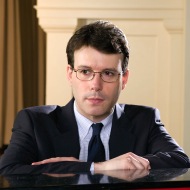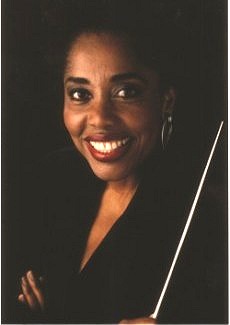 There was a fair amount of buzz a couple years ago (including here at s21), when composer Michael Hersch‘s enormous piano canvas The Vanishing Pavilions was released on CD. What the New York Times has written about Hersch’s work in general seems to apply quite well to this two-hour-plus piece: “If the symmetries and proportions of Mr. Hersch’s music evoke the grounded fixity of architecture, its dynamism and spontaneous evolution are those of the natural world. Its somber eloquence sings of truths that are personal yet not confessional… Within the sober palette, the expressive power and range are vast.”
There was a fair amount of buzz a couple years ago (including here at s21), when composer Michael Hersch‘s enormous piano canvas The Vanishing Pavilions was released on CD. What the New York Times has written about Hersch’s work in general seems to apply quite well to this two-hour-plus piece: “If the symmetries and proportions of Mr. Hersch’s music evoke the grounded fixity of architecture, its dynamism and spontaneous evolution are those of the natural world. Its somber eloquence sings of truths that are personal yet not confessional… Within the sober palette, the expressive power and range are vast.”
Turns out that this evening-length piece was only the first part of a trilogy of evening-length works — or rather, a “tet-trilogy”… The second part, Last Autumn, is a duo, and it exists in two versions: one for horn and ‘cello, the other for saxophone and cello. The horn/cello version was premiered in Philadelphia back in October last year, at the able hands of hornist (and Hersch’s brother) Jamie Hersch and cellist Daniel Gaisford. About that premiere, the Philadelphia Inquirer’s David Patrick Stearns wrote:
“As great as [The Vanishing Pavilions] is, Last Autumn eclipses it. In the airier, more distilled Autumn, whose emotional riches defy the harmonic limitations of the instruments, the music exploits the instruments in every imaginable way. …Idea and sound were inextricably one, and more viscerally exciting for it. … Long, vigorous applause indicated that Hersch’s more personal and demanding works are no longer appreciated by only a few.”
And now the saxophone and ‘cello version of Last Autumn is getting its premiere this Saturday, Feb 27 at 8pm in Merkin Hall here in NYC. Once again Gaisford is cellist, joined this time by saxophonist Gary Louie.
I had a chance to ask Hersch some questions about the work, the trilogy as a whole, and his motivations. I was also able to get a few questions to Louie, about what it feels like to be involved in a piece of this scope:
————————————————
S21: Michael, being a composer myself I know better than to ask you about why these enormous musical expanses have become necessary in your work. Still, even when following what we can’t help feel is the absolutely right path this music is leading us, short (Webern) or long (Wagner, Morton Feldman, Andrew Violette, David Toub, you), was there ever a moment where you had to look at the sheer size of these visions and think “is this crazy or what”?
Michael Hersch: When I first began to compose, many of the works I wrote were quite long. Most of these earliest efforts however are now withdrawn, including my undergraduate recital work which consisted of a single program-length piece (a work for trumpet and strings). As I progressed through my twenties I felt that I should try and broaden, or in this case contract, the canvasses which I was working with. While there are a few works still in my catalog from those years, most of the pieces I wrote during this period I also am not satisfied with. It wasn’t until my thirties that I felt able to begin to naturally express myself in works of varying lengths – especially in pieces under thirty minutes. It was at this point however that I decided to begin work on The Vanishing Pavilions, which seemed a natural outgrowth of what I had done before. I also recognized that beginning this project was a decision that would necessarily have deep implications on how and what I would write for the foreseeable future. I certainly knew that a work of this scale would have little chance of ever being programmed. That said, most anything a composer writes in our age suffers this reality. If their were performers who could play this particular work or its later siblings, they would have to commit vast amounts of time and energy to learning a piece that they rarely, if ever, would be asked to perform. For The Vanishing Pavilions, my intention was to write, premiere and record the work myself. For Last Autumn, I was remarkably fortunate to have found performers beyond myself willing to commit the necessary time to the piece. It has been a surreal experience to witness the kind of selflessness they have brought to the task of learning the music.
You asked if I thought it crazy to write music on this scale. There is certainly precedent for composers embarking on journeys like this in the past. In my case, I think I felt at a certain point that due to life’s uncertainty, my time was best spent following what seems that absolutely right path you mentioned.
S21: Do you see the piece as an evening-length work from the outset, or does it only become apparent after starting the composition?
MH: I knew that the three works of this cycle would be in the neighborhood of 3 hours each from the outset. Writing each piece has been a slow, deliberate, years-long process, with unexpected turns along the way. The Vanishing Pavilions took over four years to write, Last Autumn three years. When I complete the last work in the cycle, the entire undertaking will have taken some ten years.
S21: Certainly unique among ‘epic’ compositions has to be that the whole almost-three hours of Last Autumn is a duo for two solo melodic instruments. Was there ever a temptation along the way to add another voice or two to the mix?
MH: When I decided to write the work, I knew that the specific performers I was writing for were capable of remarkable things on their respective instruments. The cellist, Daniel Gaisford, is able to solidly convey the resources of a cello, viola and violin, creating if called upon the illusion of a string trio. In saxophonist Gary Louie, I knew I essentially had access to a quartet made up of horn, saxophone, clarinet and oboe. In the case of my brother Jamie, I knew he was capable of creating the illusion at different times of a bass trombone, tenor trombone, horn and trumpet. Ultimately, in both cases I felt I was writing for not a duo of two melodic instruments, but in fact a septet.
(more…)


 The 15th Other Minds Festival kicks off this evening, offering San Francisco a three-day immersion in contemporary music from around the world. One of the locals headlining this year is
The 15th Other Minds Festival kicks off this evening, offering San Francisco a three-day immersion in contemporary music from around the world. One of the locals headlining this year is  2009 Frederic A. Juilliard/Walter Damrosch Rome Prize winner
2009 Frederic A. Juilliard/Walter Damrosch Rome Prize winner  Composer, arts administrator, educator, and now, festival curator,
Composer, arts administrator, educator, and now, festival curator, 
 Sure, the recession has caused for cutbacks in the arts. But composers are a resilient bunch. This week, New York City will be the site for the first
Sure, the recession has caused for cutbacks in the arts. But composers are a resilient bunch. This week, New York City will be the site for the first 